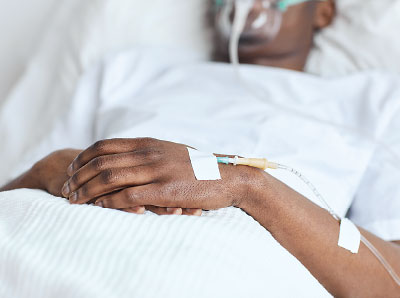C-L Psychiatrists Can Support Social Justice in Medical-Surgical Settings
Abstract
C-L psychiatrists are crucial in assisting medical and surgical teams as they work through implicit biases to provide equitable care. This article is one of a series coordinated by APA’s Council on Consultation-Liaison Psychiatry and the Academy of Consultation-Liaison Psychiatry.

The impact of police shootings and the coronavirus pandemic on people of color has led to an accelerated urgency to incorporate social justice principles into medical training. Consultation-liaison (C-L) psychiatrists are trained to think about the relationship between medical and psychiatric illness within systems of care, allowing them to be uniquely poised to highlight systemic racism and structural vulnerabilities. The following case highlights how C-L psychiatrists can conceptualize clinical care through a social justice lens.
Mr. M is a 37-year-old Haitian man with a reported history of schizophrenia who was admitted to the trauma surgery service in police custody after being shot several times during an altercation with the police. Per reports, Mr. M had attacked police with a weapon during a psychotic episode. Psychiatry was consulted three weeks into his hospitalization for assistance with agitation associated with delirium. He remained in the surgical intensive care unit for several months for surgical management, including further abdominal injury repair and reconstruction. Further history indicated that he had been nonadherent to psychiatric treatment for several months before the incident and had a history of contact with the criminal justice system. After stabilization on antipsychotics, Mr. M was able to report that he had been experiencing command auditory hallucinations at the time of his injury and had attempted “suicide by cop” to end his suffering.
Throughout his eight-month hospitalization, the C-L psychiatry service assisted the surgical team in coordinating his care with his outpatient physicians and other health care professionals at the correctional facility, given the high risk of recurrence of psychiatric symptoms, potential legal consequences of this psychotic episode, and post-trauma support. At the start of the COVID-19 pandemic, Mr. M was discharged to a prison unit at a local rehabilitation center.
Mr. M’s case is not uncommon, and many psychiatrists will recognize similarities in cases that they have encountered in their own practice. Law enforcement agencies frequently serve as first responders to mental health emergencies, including crises involving violence. About 20% of people hospitalized for severe mental illness have been arrested or picked up by police for a suspected crime during the four-month period prior to admission. Racial inequities in lethal force cases may reflect differences in the way that some law enforcement officers or agencies perceive and interact with Black communities. In medicine, many people hold culturally derived “implicit biases”—attitudes or stereotypes that affect our understanding, actions, and decisions in an unconscious manner. Resisting implicit bias requires constant vigilance and actively working toward developing an anti-racist approach.
The presence of police within the health care space may further reinforce stereotypes of injured patients as deviants and criminals and cause patients to feel unsafe in hospital settings and disenfranchised, when wrongly or rightly, they are held accountable for the cause of their injuries. Police at the bedside can contribute to long-term racial disparities after injury, including risk of re-injury, higher rates of mental illness, and the use of risky strategies, such as substance use, to cope with the physical and mental aftermath of injury. Physicians should consider procedural justice—processes used by people in positions of authority to reach specific outcomes or decisions and understanding—as people’s perception of fairness is strongly impacted by the quality of their experience and not only the end result of these experiences. This concept is critical for building trust and strengthening the physician-patient relationship.
As the case highlights, C-L psychiatrists are crucial in assisting medical and surgical teams as we work through implicit biases and help provide equitable care at the individual, clinical, institutional, and educational levels. Recognizing these biases and eliminating them provide a way forward as psychiatrists continue working to promote equity for patients at the intersection of psychiatry and general medicine. ■




